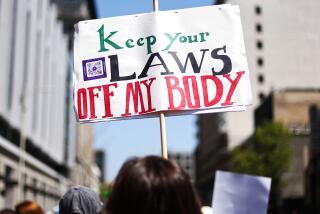Getting the Big Boys Off Our Backs : Our democracy is rooted in the 10th Amendment; in the new Congress, it will be rediscovered.
- Share via
For many years, liberals have been faithful to their own abridged version of the Bill of Rights.
For the most part, the left has willingly subscribed to the Constitution’s restrictions on government authority, the protections of speech and the press, the constraints on police power. Liberals have even acknowledged the existence of the Second Amendment, which protects the citizen’s right to own a gun, although the acknowledgment comes mostly in the form of attempts at circumvention. And they not only honor the freedom of religious practice, they even go the Constitution one better, demanding a strict separation of church and state, which is not at all what the founders had in mind. Under the protection of liberals in Congress and the courts, the left’s version of the Bill of Rights has been relatively safe; the first nine amendments have received either allegiance or acknowledgment.
Now, however, conservatives are in charge, and as they have begun to forage around in the debris of Big Government, they have found still another amendment, a 10th, buried and almost forgotten, a remnant of the days before the great experiment of modern liberalism.
Of all the constitutional amendments that make up the Bill of Rights, the 10th is the most direct. In much of the world, governments are thought to grant rights to their citizens. In the United States, however, political and civil rights are presumed to belong to the people themselves, by right of birth. Unless those rights are specifically delegated to government, they are retained by the people. It’s a revolutionary idea. In fact, it’s the revolutionary idea.
Just to make sure that nobody missed the point, the framers stated the idea succinctly: All rights not delegated to the government were retained by the states or the people. In other words, power resides with the people or that branch of government closest to them.
It is that concept--government at the local level--that Republicans will restore. Along with the separation of powers between the different branches of the federal government, the Founding Fathers balanced power between the national government, which had only that authority specifically assigned to it, and the state governments, which had all the rest. During the years of the liberal expansion, with a proliferation of federal agencies and regulations, Americans came increasingly to think of “government” as “Washington.” That will no longer be the case.
To some extent, the flow of power back to the states will be driven by the less visible half of the Republican sweep in last month’s elections: the new Republican domination of state governments. And they are determined to set their own agendas. They will push hard for a return to federalism, the division of power between national government and the states, and the new Republican Congress will be eager to go along.
Liberals, too, paid lip service to the role of the states: State governments were encouraged to experiment with alternative programs to deliver health care, or regulate traffic, or police cities, or provide welfare benefits. But the idea was that the Big Boys in Washington would then evaluate these “pilot programs,” decide which ones worked best and nationalize them.
At other times, faced with budget constraints but unwilling to forgo the right to order local governments how to behave, Congress simply issued regulatory orders to states, which then had to raise taxes to pay the cost of implementation.
Already, Republicans have indicated that they will reduce the number of these unfunded mandates. If state and local governments are required to implement federal regulations, they will be given the funds to do so. More and more, however, they will simply be given block grants and allowed the flexibility to design programs geared to local circumstances.
Where this will lead, eventually, is to the federal government turning programs entirely back to those governments closest to the people--the state and municipal governments, where the mayors live across town, the council members may live next door and the legislators and governors live close enough to be pestered by concerned citizens. As they perceive that they have an ability to be heard and to affect outcomes, more citizens will be encouraged to participate in the political process.
The root of American Democracy is in the 10th Amendment to the Constitution, the anchor of the Bill of Rights. It is about to be rediscovered.
More to Read
Get the L.A. Times Politics newsletter
Deeply reported insights into legislation, politics and policy from Sacramento, Washington and beyond. In your inbox twice per week.
You may occasionally receive promotional content from the Los Angeles Times.










